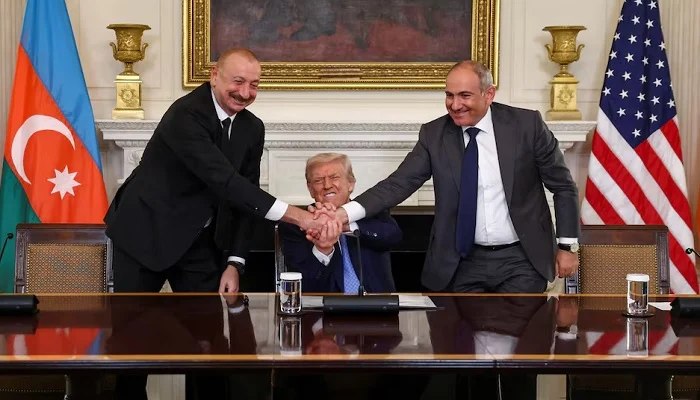Azerbaijan and Armenia signed a historic US-mediated peace agreement on Friday, marking a potential end to 35 years of hostilities between the two South Caucasus nations. The deal, announced at the White House with President Donald Trump presiding, commits both countries to halt fighting, open diplomatic relations, and recognize each other’s territorial sovereignty. Trump called the agreement a major breakthrough, stating, “They fought for years, and now they’re friends.”
The conflict traces back to the late 1980s when Nagorno-Karabakh, an Azerbaijani region with an ethnic Armenian majority, sought independence with Armenia’s support. Azerbaijan regained full control in 2023, leading to a mass exodus of ethnic Armenians. The new peace deal includes US development rights to a strategic transit corridor, enhancing energy and trade flows in the region. Additionally, Washington signed separate pacts with both nations to expand cooperation in energy, AI, and defense.
Both Azerbaijani President Ilham Aliyev and Armenian PM Nikol Pashinyan credited Trump with securing the agreement and pledged to nominate him for the Nobel Peace Prize. The White House framed the deal as part of Trump’s broader peacemaking efforts, following recent ceasefires in Cambodia-Thailand, Rwanda-DRC, and Pakistan-India. However, his administration has yet to resolve Russia-Ukraine or Israel-Hamas conflicts.
The agreement could reshape the South Caucasus, a key energy hub bordering Russia, Iran, and Turkey. US officials called it the first resolution of a frozen post-Soviet conflict and a signal to the region. Meanwhile, rights groups urged the US to address Azerbaijan’s human rights record, including political prisoners. As the deal unfolds, questions remain over Moscow’s reaction and whether this peace will hold—or face new challenges.














